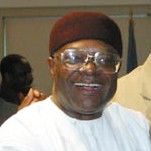


Posted by By DULUE MBACHU, Associated Press Writer on



A militia group in the Niger Delta will launch "a full-scale armed struggle" to wrest control of the region's oil riches from the Nigerian government starting Oct. 1, the group's leader declared Tuesday.
LAGOS, Nigeria - A militia group in the Niger Delta will launch "a full-scale armed struggle" to wrest control of the region's oil riches from the Nigerian government starting Oct. 1, the group's leader declared Tuesday.
Military spokesman Col. Ganiyu Adewale played down the warning, calling it "an empty threat" from a group that officials routinely dismiss as criminals.
Militia leader Moujahid Dokubo-Asari, who heads the Niger Delta People's Volunteer Force, warned oil companies that all their employees would be targets and he advised foreign embassies to pull their nationals out of the southern region.
"We will start a full-scale armed struggle" on Oct. 1 - the 44th anniversary of Nigeria's independence from Britain - Dokubo-Asari told The Associated Press by telephone.
"Any part of Nigeria, wherever we have the opportunity to strike any target, we will strike," he said on a day when crude oil prices topped $50 per barrel for the first time.
Nigeria is Africa's leading oil producer, the world's seventh-largest exporter and the fifth-biggest source of U.S. oil imports. Nearly all Nigeria's daily oil exports come from the Niger Delta region.
The violence in Nigeria, a member of the Organization of Petroleum Exporting Countries, has put added pressure on prices of crude at a time when oil is already at historic highs.
Although it's difficult to determine the militia's strength, Dokubo-Asari claims to command 2,000 fighters and to have the support of tens of thousands more armed ethnic Ijaw fighters in the region. His group has battled government troops in the delta since April.
President Olusegun Obasanjo's government says militia members are gangsters who illegally tap pipelines and sell the oil to buy arms and fund criminal activities.
But Dokubo-Asari claims to be fighting for the self-determination of more than 8 million Ijaws, the dominant tribe in the delta.
"We will target government infrastructure and oil company personnel," Dokubo-Asari said. "Oil facilities will not be targeted since it will endanger the environment."
But Adewale, the military spokesman, played down the threat.
"All oil installations are being manned by the armed forces and oil workers are safe. The military is there to contain the situation. I foresee no problems at all," he said.
Dokubo-Asari alleged that local subsidiaries Royal Dutch/Shell, Italy's Agip and other oil multinationals in Nigeria have provided government troops with helicopters and maps that aided the bombardment of rebel camps hidden among the delta's creeks and mangrove swamps.
On Sunday, Dokubo-Asari's fighters said only helicopters belonging to Agip had helped government forces target their positions.
Shell's Nigeria unit said Tuesday in a statement that it regularly supplies Nigeria with maps as part of its regulatory obligations, but that it hasn't supplied new charts to any group since the crisis began.
Shell, which accounts for roughly half of Nigeria's daily production of 2.5 million barrels, said it had shut down an oil flow station in the Niger Delta that pumps 28,000 barrels a day because it could not get staff there to fix a "technical problem."
"The security situation in the swamps of the eastern area of operation of the Shell Petroleum Development Company is still tense, and the risk of water transportation is high," the company said in a statement.
A representative of Italy's Eni SpA, Agip's parent company in Rome, said it had no plans to evacuate staff from Nigeria and added its exports of about 200,000 barrels of oil daily would not be affected.
Nigeria's military launched its latest offensive against Dokubo-Asari's fighters early this month in response to deadly raids by his militia into Nigeria's main oil industry center, Port Harcourt, in August.
Since then, army helicopter gunships and troops in gunboats have raided and bombarded 10 towns and villages considered militia strongholds, resulting in dozens of deaths, militia leaders say.
Amnesty International said at least 500 people were killed in August alone in fighting involving rival militia groups and the army in and around Port Harcourt.
Dokubo-Asari has said his fighters will only lay down their arms if the government convenes a "sovereign national conference" to discuss self-determination and greater control of oil wealth by the inhabitants of the region.
Widespread violence in the delta often results in severe disruptions to oil operations. In March 2003, fighting between rival ethnic militia groups in the west of Niger Delta near the oil port city of Warri - which drew in government troops - forced oil companies to shut down 40 percent of Nigeria's exports for several weeks.

